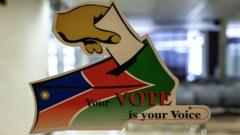The year has witnessed a surprising trend of electoral setbacks for governing parties in sub-Saharan Africa, including major losses in Namibia, Botswana, and Mauritius. Economic distress, public disillusionment with corruption, and assertive opposition coalitions are fueling changes, indicating a democratic resilience amidst global authoritarian trends.
Voter Sentiment Shifts: Democratic Resilience in Sub-Saharan Africa

Voter Sentiment Shifts: Democratic Resilience in Sub-Saharan Africa
A wave of electoral changes across sub-Saharan Africa is signaling a shift in voter sentiment, with long-standing governing parties facing unexpected defeats, raising questions about governance and accountability.
The recent elections across sub-Saharan Africa have sparked a significant shift in voter behavior as incumbents are being challenged and often defeated, marking an unusual year for the region's political landscape. In Namibia, Swapo, the ruling party for over three decades, saw its grip on power loosen, with presidential candidate Netumbo Nandi-Ndaitwah winning only 57% of the vote amidst allegations of electoral irregularities. Opposition parties have voiced their discontent, questioning how Swapo could increase its presidential vote share while declining in parliamentary seats.
Across the continent, this trend has paralleled an "annus horribilis" for several governments in sub-Saharan Africa, exposed by various elections held under relatively democratic conditions. Many governing parties either faced significant seat reductions or outright defeats, largely attributed to public disillusionment stemming from a deteriorating economy, rampant corruption, and a surge in opposition tactics.
Countries that once seemed politically stable have seen shocking electoral turns. The Botswana Democratic Party, long in power since 1966, faced a dramatic downfall in the October elections, plummeting from 38 seats to just four in a 69-member parliamentary body. Similarly, in Mauritius, the Alliance Lepep coalition suffered a catastrophic defeat, securing merely 27% of the vote and holding only two parliamentary seats—signifying a dramatic turnaround when the opposition seized 60 of 66 available seats.
In Senegal, the situation mirrored these trends, with opposition leaders gaining momentum after release from imprisonment right before elections, resulting in a first-round victory for their candidate against the incumbent’s 36%. While many governments, such as South Africa’s African National Congress (ANC), managed to retain power, they did so with diminished credibility, forcing coalition negotiations that limited their governing authority.
An overarching narrative this year is the public's growing frustration with economic hardship and perceived government failures. High costs of living, driven by inflation, have taken a toll on citizens, mirroring global dissatisfaction observed in places like the UK and the US.
Emerging strategies among opposition groups contributed to these unexpected electoral outcomes. In Mauritius, intense scrutiny of the electoral process played a key role, while in Botswana, the formation of an opposition coalition named the Umbrella for Democratic Change mobilized effectively against the ruling party.
Looking ahead, these trends could pose significant challenges to Ghana's New Patriotic Party and President Lazarus Chakwera's government in Malawi as elections approach in 2025. The current wave of opposition victories, if it continues, could reshape sub-Saharan Africa's political landscape, indicating a noteworthy resilience against authoritarianism at a time of global democratic decline.
Contrary to the notion of entrenched authoritarian regimes, these electoral shifts suggest that African nations possess a robust democratic spirit, evidenced by the numerous collective actions demanding accountability. Global observers and advocates for democracy are urged to recognize and learn from this resilience, as sub-Saharan Africa continues to navigate its complex political terrain.




















